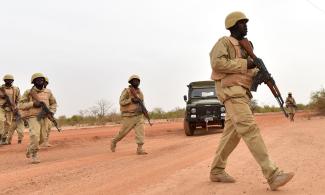
Soldiers killed 44 people, including 20 children, in Nondin village, and 179 people, including 36 children, in the nearby Soro village, of Thiou district in the northern Yatenga province, it said.
The Burkina Faso military summarily executed at least 223 civilians, including at least 56 children, in two villages on February 25, 2024, Human Rights Watch said on Thursday.
According to HRW, the mass killings, among the worst army abuse in Burkina Faso since 2015, appear to be part of a widespread military campaign against civilians accused of collaborating with Islamist armed groups.
It said the killings may amount to crimes against humanity.
Soldiers killed 44 people, including 20 children, in Nondin village, and 179 people, including 36 children, in the nearby Soro village, of Thiou district in the northern Yatenga province, it said.
HRW called on Burkinabè authorities to urgently undertake a thorough investigation into the massacres, with support from the African Union and the United Nations to protect its independence and impartiality.
“The massacres in Nondin and Soro villages are just the latest mass killings of civilians by the Burkina Faso military in their counterinsurgency operations,” said Tirana Hassan, executive director of Human Rights Watch.
“The repeated failure of the Burkinabè authorities to prevent and investigate such atrocities underlines why international assistance is critical to support a credible investigation into possible crimes against humanity.”
HRW said from February 28 to March 31, it interviewed 23 people by telephone, including 14 witnesses to the killings, 3 local civil society activists, and 3 members of international organizations. The organisation said it verified videos and photographs shared by survivors of the aftermath of the killings and injured survivors.
On February 24 and 25, Islamist armed groups carried out several attacks across the country on military targets, including barracks and bases, and on civilian infrastructure, such as religious sites, killing scores of civilians, soldiers, and militia members, it alleged.
Burkinabè Defense Minister Mahamoudou Sana, in a February 26 statement to the media, denounced what he described as “simultaneous and coordinated” attacks by Islamist fighters, but made no mention of the mass killings of civilians in Nondin and Soro.
On March 1, Aly Benjamin Coulibaly, prosecutor of the high court in Ouahigouya said in a statement that he received reports of “massive deadly attacks” on the villages of Komsilga, Nodin and Soro in Yatenga province on February 25, with a provisional toll of “around 170 people executed,” and others injured, and that he ordered an investigation.
On March 4, Coulibaly said that he had visited the sites of the incidents along with the judicial police on February 29, but indicated that he was not able to locate the dozens of bodies he had been told were there.
According to HRW, villagers said that on February 25, military forces first stopped in Nondin, then in Soro, five kilometres away. They believe that the killings were perpetrated in retaliation for an attack by Islamist fighters against a Burkinabè military and militia camp outside the provincial capital, Ouahigouya, about 25 kilometers from Nondin, earlier that day.
“Before the soldiers started shooting at us, they accused us of being complicit with the jihadists [Islamist fighters],” said a 32-year-old woman survivor from Soro who was shot in the leg. “They said we do not cooperate with them [the army] because we did not inform them about the jihadists’ movements.”
On February 25, the Radiodiffusion Télévision du Burkina (RTB), the government-run national television network, reported “a major attack” by Islamist fighters around 7 a.m. “against the mixed battalion” military base in Ouahigouya. It said that soldiers of the Rapid Intervention Battalion (Batallion d’Intervention Rapide, BIR), a special forces unit involved in counterinsurgency operations, “chased the fighters fleeing towards Thiou” and “neutralized the maximum of those who could not” flee.
The report, which made no reference to civilian casualties, stated that soldiers requested that aerial drones not follow the fighters they were chasing, and to “leave this group to them,” perhaps indicating that they did not want the drones to record what followed.
Witnesses told HRW that between 8:30 and 9 a.m., about 30 minutes after a group of armed Islamist fighters passed near the village yelling “Allah Akbar!” (God is great), a military convoy with over 100 Burkinabè soldiers arrived on motorbikes, in pickup trucks, and at least two armoured cars in Nondin’s Basseré neighborhood located near the asphalted National Road 2.
They said the soldiers went door-to-door, ordering people out of their homes and to show their identity cards. They then rounded up villagers in groups before opening fire on them. Soldiers also shot at people trying to flee or hide.
The report said villagers described a similar scenario in Soro, where soldiers arrived about an hour later and shot people who had been rounded up or who tried to hide or escape.
“They separated men and women in groups,” said a 48-year-old farmer. “I was in the garden with other people when they [soldiers] called us. As we started moving forward, they opened fire on us indiscriminately. I ran behind a tree, and this saved my life.”
Human Rights Watch obtained two lists of the victims’ names compiled by survivors and others who helped bury the bodies. Witnesses said that survivors and people from nearby villages buried the bodies in Nondin in three mass graves and those in Soro in eight.
Some bodies in both villages, they said, were buried individually since they were recovered days later in the bush.